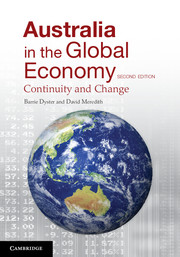Book contents
- Frontmatter
- Contents
- List of Tables
- List of Figures
- Preface
- 1 Introduction, themes and overview
- Part I Before 1914
- 2 International impacts on Australia before 1914
- 3 Australia before 1914
- Part II 1914 to 1940
- Part III 1941 to 1973
- Part IV 1974 to the 1990s
- Part V Since the 1990s
- Statistical appendix
- Glossary of economic terms
- Bibliography
- Index
- References
3 - Australia before 1914
from Part I - Before 1914
Published online by Cambridge University Press: 05 November 2012
- Frontmatter
- Contents
- List of Tables
- List of Figures
- Preface
- 1 Introduction, themes and overview
- Part I Before 1914
- 2 International impacts on Australia before 1914
- 3 Australia before 1914
- Part II 1914 to 1940
- Part III 1941 to 1973
- Part IV 1974 to the 1990s
- Part V Since the 1990s
- Statistical appendix
- Glossary of economic terms
- Bibliography
- Index
- References
Summary
When Australia became an independent nation at the beginning of 1901, the United Kingdom was, as we have seen, the world’s major financial, trading and military power, and the largest exporter of people, goods and capital. It was at the centre of the first global economy. Almost one-fifth of the people then in Australia had been born in the United Kingdom, and most of the rest were descended from British or Irish immigrants. A little more than half of Australia’s exports went to Britain, and about three-fifths of Australia’s imports came from there. Nearly all of the overseas capital was British, and sterling, the (British) world currency, continued as Australia’s currency until 1910, while for a further 20 years – until the Great Depression of the 1930s – the Australian pound was held resolutely on par with the pound sterling.
The Commonwealth of Australia did not begin with a unilateral declaration of independence. The Australian Constitution only had legal force once it passed as an Act of the British parliament in 1900. The British government encouraged the six colonies to federate and to bear greater responsibility for their own management, which would reduce the cost and complexity of Britain’s involvement in the South Pacific. The Constitution included a right of appeal from Australian law courts to the Privy Council in London (sections 73 and 74), and Clause 5 in its Preamble exempted from Australian laws British shipping when in Australian waters, except when the formal port of clearance and the last port of call were both in Australia. These imperial restrictions on sovereignty ensured that the interests of British investors and traders were not solely at the mercy of Australian decisions. A Coalition government in 1968 and a Labor government in 1975 reduced the scope of appeal outside the country, but British extra-territorial rights were extinguished only by the passage of the Australia Act through both the British and Australian parliaments in 1986 (Solomon 1992, pp. 120–32).
- Type
- Chapter
- Information
- Australia in the Global EconomyContinuity and Change, pp. 53 - 76Publisher: Cambridge University PressPrint publication year: 2012



